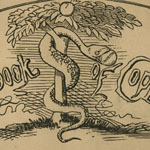
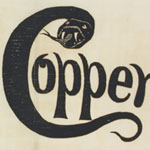
|
Charles Godfrey Leland, Ye Book of Copperheads (Philadelphia, 1863, with lithographed advertisement).
“Copperheads” was the Unionists’ label for Northern supporters of the South, particularly the “Peace Democrats” who wanted a negotiated settlement of the war and a return to the Union “as it was.” Humorist Leland satirizes them in comic verse and cartoons.
|
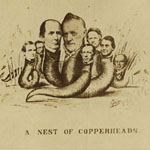 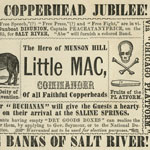
|
A Nest of Copperheads. Albumen print cartoon (Philadelphia, 1864). And, The Great Copperhead Jubilee ! On the Banks of Salt River. Illustrated cartoon card (Philadelphia, 1864).
The cartoon photograph depicts Democratic leaders like ex-President James Buchanan and local pro-Southern Democrat William B. Reed. The card, in the form of a ticket, invites Peace Democrats to travel to the banks of the Salt River, a popular term for political oblivion. Salt River political cartoon cards had been popular since the 1840. McAllister’s extensive collection of them extends from the 1840s to the1870s. |
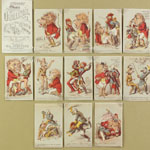 |
Henry Louis Stephens, Our Relations at Home and Abroad. Chromolithographed cartoon cards (Philadelphia, 1863).
Artist Henry Louis Stephens’ series of twelve collectable cartoon cars satirizes efforts by the British and the French to intervene in the Civil War, effect a peace, and possibly recognize the Confederacy to restore the lucrative Southern cotton trade. The British are represented as the lion, the French the rooster, and the eagle the Americans. |
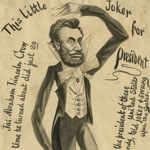
|
Henry Louis Stephens caricatures of candidates Lincoln and McClellan depict Lincoln as a Jim Crow jokester, and McClellan as a would-be Napoleon. |
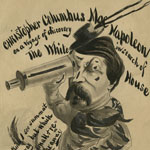 |
Henry Louis Stephens, The Little Joker for President, and Christopher Columbus Mac Napoleon. Lithographed cartoons (Philadelphia, 1864). |
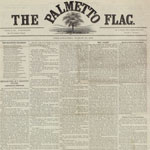 |
The Palmetto Flag. Volume I, Number 1. Philadelphia, March 30, 1861.This new pro-Southern newspaper was attacked by a pro-Union mob and suspended publication after three issues. |
 |
Head Quarters Jewish Union Republican Association, New York, Pennsylvania and Indiana, To Our Jewish Brethren (n.p., 1864).
American Jews were reluctant to enter the political fray. This association urges them to get involved and donate time and money to reelect Lincoln. “We call earnestly on our Jewish brethren to bring heart and soul, influence and wealth to this great movement.” |
 |
Campaign Dial. Philadelphia, Thursday, September 8, 1864.
This daily newspaper of the National Union Party (i.e. Republicans) rallied voters for Lincoln and Johnson with biting articles and cartoons and news of campaign events. |
 |
Union League of Philadelphia (Philadelphia, 1862).
The Union League movement was begun in Chicago, and established here in 1862. They were vigorous promoters of the Union cause, raising funds to organize regiments, supporting the Union political establishment, and in the forefront of recruiting African American soldiers. They became a vital businessmen’s group and remain so today. In spite of rule number 4, they today have a great bar and a handsome billiard room. |
 |
Ribbon. Union and Liberty. For President, Abram Lincoln. White background. Liberty with flag. |
 |
Pink Ribbon or Banner. Lincoln, Hamlin and Liberty. |
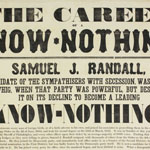 |
The Career of a Know-Nothing! Samuel J. Randall (Philadelphia, 1864).
If mudslinging is an art form, then the political campaigners of the Civil War period were masters, their rhetoric often as violent as the battlefields. In this broadside attacking Congressional candidate Samuel J. Randall his career as a political opportunist is deftly summarized in a quick paragraph. By calling him a “know-nothing,” a supporter of the 1850s anti-immigrant and largely anti-Catholic American Party, Republicans could hope to solidify support of German American voters and chip away at the support of Irish Americans for the Democratic Party. They were unsuccessful; Randall won, and served in Congress for many years. |
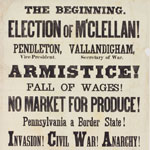 |
The Beginning. Election of McClellan (Philadelphia, 1864).
This unusually laconic broadside quickly charts the road to ruin should McClellan become President. |
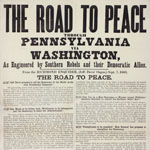 |
The Road to Peace through Pennsylvania via Washington (Philadelphia, 1864).
Democrats are charged with supporting the Confederate conquest by linking them to sentiments expressed in the Richmond Enquirer. Robert E. Lee’s successes will insure the success of the Democrats and lead to the conquest of Washington and triumph of the Confederates. Republicans here link Democrats with support for the invasion of Pennsylvania. |
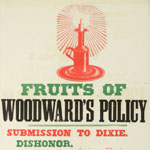 |
Fruits of Woodward’s Policy (Philadelphia, 1863).
The hard-fought gubernatorial campaign of 1863 followed on the heels of the battle of Gettysburg and the creation of the National Cemetery, which tipped support to the Republicans. In this terse broadside they summarize the consequences of a victory for Democrat George Washington Woodward, a Pennsylvania Supreme Court Justice and an ardent Southern supporter. |
















